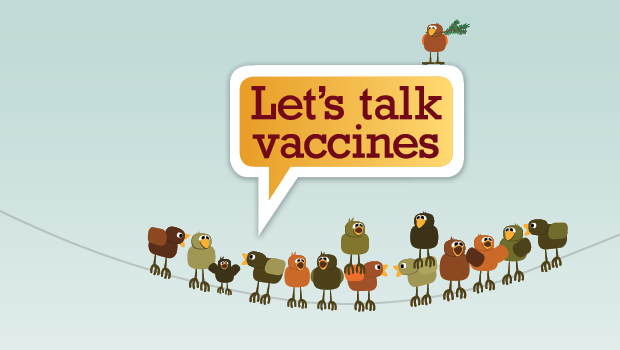Let’s Talk Vaccines—and the power of negative results

What we learned in new research on doctor-parent conversations about vaccines, from study coauthor Dr. David Grossman
As a pediatrician, one of my deepest concerns is when I encounter parents who decide either to defer vaccinations or not to give their child one or more vaccines. It used to be unusual for parents to question the value of vaccines, or assert that their child didn’t need them. But now, at least in the Pacific Northwest, many parents are hesitant about childhood vaccines. The recent Disneyland measles outbreak demonstrated the consequences of underimmunization. We have to do better by our children. That means protecting them from diseases that often used to kill or harm children—and could do so again unless we take action.
As a step toward reducing vaccine hesitancy, my colleague Dr. Nora Henrikson and I were part of a team that rigorously tested a new approach to training pediatricians and family medicine physicians, including a control group: “Physician Communication Training and Parental Vaccine Hesitancy: A Randomized Trial,” published in Pediatrics. Read our news release and an accompanying editorial. We know that doctors are a highly trusted source of health information for new parents. We also know that many doctors have trouble convincing hesitant parents to give their children the vaccines they need, on the recommended schedule. Our team of researchers from Group Health Research Institute, Seattle Children’s Hospital, the University of Washington, the Washington State Department of Health, and WithinReach developed a program to help physicians with vaccine conversations. The approach was Ask, Acknowledge, and Advise: Doctors learned to ask new mothers if they had vaccine questions, acknowledge concerns, and advise about the reasons for the recommended vaccine schedule. The training for the doctors was only 45 minutes—not very intensive but easy to do in practice and, we hoped, enough to reframe vaccine conversations.
We used a randomized trial design to measure the impact of the program by randomly assigning clinics either to have or not to have the training available for their doctors. At clinics with and without training, parents were recruited to the study when they delivered a baby at a Seattle-area hospital. We called the moms to ask their beliefs about vaccination and tracked their responses over time. We wanted to know if any initial vaccine hesitancy would change after the mothers talked with their babies’ doctors in the first visits after birth.
What we learned from the Let’s Talk Vaccines project
The good news is that at the end of the study, the level of vaccine hesitancy was, on average, only about 8 percent overall, which was much lower than earlier estimates in the area. However, the rates of hesitancy over time were not different between clinics with and without the program: The training didn’t have an impact on parental vaccine hesitancy.
Our team was hoping to decrease vaccine hesitancy, but we can still learn much from this “negative study.” We learned that we need to do more to understand the best communication strategy about vaccines: the messages and the intensity of training. We’re now asking: How can we make hesitant parents feel more confident about the remarkable safety record and high effectiveness of vaccines? How can we ensure that hesitant parents understand the major risks of vaccine-preventable diseases that are still very much around us? Can other kinds of interventions, including parent-to-parent ones, play an important role? Would longer training for doctors, with more reinforcement, be more effective? Some people have suggested that a different, more directive kind of training for doctors might be more effective—but that’s how medicine has usually been practiced already. We and other researchers will use what we’ve learned from this study … and we’ll keep trying to help physicians and parents talk about the safety and necessity of vaccination.
We’re glad that so many parents in our study understood the importance of vaccinating their children on schedule. And if you are one of the many parents whose child is up to date with vaccinations, congratulations! You’ve not only protected your own child but the many children and adults in your community. Feel proud and feel empowered to encourage others to do the same.
The “Let’s Talk Vaccines” project was funded by the Group Health Foundation and the Bill & Melinda Gates Foundation. We are particularly grateful to them both for funding this research so quickly.
Dr. David Grossman is a pediatrician with Group Health Physicians and a Group Health Research Institute Senior Investigator.


